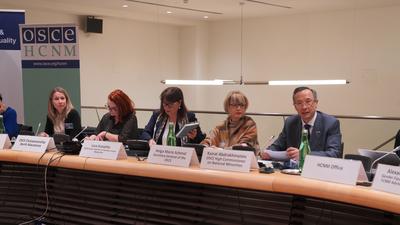-
Our work
-
Fields of work
- Arms control
- Border management
- Combating trafficking in human beings
- Conflict prevention and resolution
- Countering terrorism
- Cyber/ICT Security
- Democratization
- Economic activities
- Education
- Elections
- Environmental activities
- Gender equality
- Good governance
- Human rights
- Media freedom and development
- Migration
- National minority issues
- Policing
- Reform and co-operation in the security sector
- Roma and Sinti
- Rule of law
- Tolerance and non-discrimination
- Youth
- Field operations
- Projects
-
Meetings and conferences
- Summit meetings
- Review Conferences
- Ministerial Council meetings
- Plenary meetings of the Permanent Council
- Plenary Meetings of the Forum for Security Co-operation
- Security Review Conferences
- Annual Implementation Assessment Meetings
- Economic and Environmental Forum
- Economic and Environmental Dimension Implementation Meetings
- Human rights meetings
- Media conferences
- Cyber/ICT security conferences
- Conference of the Alliance against Trafficking in Persons
- Gender equality conferences
- Annual OSCE Mediterranean conferences
- Annual OSCE Asian conferences
- Partnerships
-
Fields of work
-
Countries
- All
-
Participating States
- Albania
- Andorra
- Armenia
- Austria
- Azerbaijan
- Belgium
- Belarus
- Bosnia and Herzegovina
- Bulgaria
- Canada
- Croatia
- Cyprus
- Czechia
- Denmark
- Estonia
- Finland
- France
- Georgia
- Germany
- Greece
- Holy See
- Hungary
- Iceland
- Ireland
- Italy
- Kazakhstan
- Kyrgyzstan
- Latvia
- Liechtenstein
- Lithuania
- Luxembourg
- Malta
- Moldova
- Monaco
- Mongolia
- Montenegro
- The Netherlands
- North Macedonia
- Norway
- Poland
- Portugal
- Romania
- Russian Federation
- San Marino
- Serbia
- Slovakia
- Slovenia
- Spain
- Sweden
- Switzerland – OSCE Chairpersonship 2026
- Tajikistan
- Türkiye
- Turkmenistan
- Ukraine
- United Kingdom
- United States of America
- Uzbekistan
- Asian Partners for Co-operation
- Mediterranean Partners for Co-operation
-
Structures and institutions
- Chairpersonship
-
Secretariat
- Secretary General
- Office of the Secretary General
- Conflict Prevention Centre
- Transnational Threats Department
- Office of the Special Representative and Co-ordinator for Combating Trafficking in Human Beings
- Office of the Co-ordinator of OSCE Economic and Environmental Activities
- Gender Issues Programme
- Opportunities for Youth
- Department of Human Resources
- Department of Management and Finance
- Office of Internal Oversight
- Documentation Centre in Prague
- Institutions
-
Field operations
- Presence in Albania
- Centre in Ashgabat
- Programme Office in Astana
- Programme Office in Bishkek
- Mission to Bosnia and Herzegovina
- Programme Office in Dushanbe
- Mission in Kosovo
- Mission to Moldova
- Mission to Montenegro
- Mission to Serbia
- Mission to Skopje
- Project Co-ordinator in Uzbekistan
- Closed field activities
- Parliamentary Assembly
- Court of Conciliation and Arbitration
- Organizational structure
- About us
News Item
OSCE presents research on the connection between gender equality and national minorities
On 28 March, OSCE Secretary General Helga Maria Schmid and High Commissioner on National Minorities (HCNM) Kairat Abdrakhmanov presented the findings of the research on the intersectionality of gender and national minorities.

- Issued on:
- Issued by:
- OSCE Secretariat, OSCE High Commissioner on National Minorities
- Fields of work:
- Gender equality
On 28 March, OSCE Secretary General Helga Maria Schmid and High Commissioner on National Minorities (HCNM) Kairat Abdrakhmanov presented the findings of the research on the intersectionality of gender and national minorities.
An event, organized by the office of the HCNM in co-operation with the Gender Issues Programme, aimed to draw the attention of OSCE participating States to the scarcity of comprehensive data on interlinkages between gender equality and national minority issues.
“This research shows that national minority women face unique challenges and obstacles, which should not go unnoticed or unaddressed,” said OSCE Secretary General Schmid. “It is essential to listen to them and their experiences and work together to strengthen their participation and rights – this will benefit the whole society”, she added.
The research found that minority women in need of support are often not aware of public services that are available. They also face specific challenges such as lacking personal documentation, and higher rates of poverty and unemployment. Traditional gender roles and expectations for girls to marry young and take care of their families are among the main reasons why minority girls drop out of school. For minority women, political participation is closely linked to engagement in civil society- a dimension that can be leveraged to boost involvement in public life.
Participants also discussed best practices that can support the full and equal involvement of national minority women in public life, improve their access to economic and social rights, and increase their participation in processes for peace and security.
High Commissioner Kairat Abdrakhmanov noted that achieving equality for minority women requires a multilayered approach to tackle an issue that is complex, multifaceted and often difficult to analyze. High Commissioner Abdrakhmanov stressed that factors such as socio-economic inequalities in society, structural discrimination, rural-urban divides and traditional gender roles should be accounted for and reflected in participating States’ policies. “Only then, will societies be truly inclusive and as such more resilient to crisis and conflict”, he added.
Participants highlighted that co-operation within and between participating States and larger multilateral structures is key to achieving sustainable equality. With this research project and event, the office of the HCNM and the Gender Issues Programme drew attention to the joint OSCE commitment to address exclusion and discrimination when it comes to national minority women. The research was commissioned under the WIN for Women and Men: Strengthening Comprehensive Security through Innovating and Networking for Gender Equality (WIN) project. This project advances gender equality to achieve and maintain stable, prosperous, and peaceful societies in the OSCE area.
Read more on this topic
The OSCE bears no responsibility for the accuracy, legality or content of the external links provided.